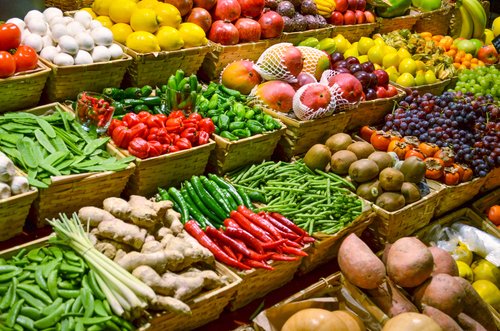By Christine Haas

Summer is a great time to strive for 5 servings of fruits and vegetables a day! However, fresh fruits and vegetables can be pricy, especially the “organic” produce. To save you a few dollars this season, here is our take on the “organic” issue, including a few suggestions to help you make the healthiest food choices without draining your bank account.
As many of us know, organic foods limit the harmful chemicals we consume because pesticides and fertilizers are not allowed to be used on certified organic crops. The absence of pesticides may also cause organic plants to be higher in antioxidants because unfertilized plants are forced to develop somewhat stronger defenses against pests which may increase the antioxidant content.
The good news is not ALL fruits and vegetables retain the same amount of pesticide residue. Here are our top recommendations to help you lower your intake of harmful chemicals and pesticides this summer while keeping your food budget under control.
1) Wash ANY kind of produce if you can only buy a select amount of organic items.
2) Chose the “Dirty Dozen” (foods that most likely contain the most amount of pesticide residue) and the “Clean Fifteen” (foods that contain the least amount of pesticide residue) published by the Environmental Working Group for guidance as to the most important produce to buy organic.
The full Dirty list: Apples, strawberries, grapes, celery, peaches, spinach, sweet bell peppers, imported nectarines, cucumbers, cherry tomatoes, imported snap peas and potatoes.
The Clean list: Avocados, sweet corn, pineapples, cabbage, frozen sweet peas, onions, asparagus, mangoes, papayas, kiwis, eggplant, grapefruit, cantaloupe, cauliflower and sweet potatoes.
Happy eating!
 Christine Haas, M.S., L.D.N., C.N.S., C.P.T., is the president and director of NuWeights Nutrition and Personal Training, a nutrition and fitness business established in 2005 with six office locations in the D.C. Metro area. Haas is also a licensed nutritionist in Maryland and D.C., certified through the American College of Nutrition, and is a personal trainer certified through the National Academy of Sports Medicine. Haas is a member of the American Dietetic Association and holds a number of fitness and nutrition certifications, including The Certificate of Training in Adult Weight Management from the American Dietetic Association. She has also received a Masters of Science Degree in Health and Fitness Management from The American University in D.C. and a Masters Degree in Nutrition Education from The University of Vermont.
Christine Haas, M.S., L.D.N., C.N.S., C.P.T., is the president and director of NuWeights Nutrition and Personal Training, a nutrition and fitness business established in 2005 with six office locations in the D.C. Metro area. Haas is also a licensed nutritionist in Maryland and D.C., certified through the American College of Nutrition, and is a personal trainer certified through the National Academy of Sports Medicine. Haas is a member of the American Dietetic Association and holds a number of fitness and nutrition certifications, including The Certificate of Training in Adult Weight Management from the American Dietetic Association. She has also received a Masters of Science Degree in Health and Fitness Management from The American University in D.C. and a Masters Degree in Nutrition Education from The University of Vermont.


